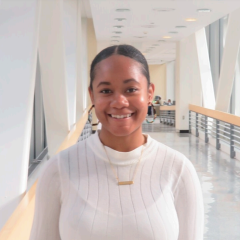Meet the Study Team

Ulf G. Bronas, PhD, ATC, FSVM, FAHA
Principal Investigator
Adjunct Research Professor
Biobehavioral Science in NursingDr. Bronas is a Professor of Biobehavioral Science in Nursing, and Rehabilitation and Regenerative Medicine at Columbia University in New York City. He directs the Bronas Laboratory of Cognitive and Vascular Health that is focused on the management and prevention of cognitive decline and vascular disease. Dr. Bronas has a vibrant research program funded by the National Institute of Aging investigating the intersection between cognition and vascular function, brain structure, and neural network plasticity, and the impact of exercise training in older adults with chronic kidney disease and mild cognitive impairment. He is further investigating the impact of living environment, neighborhood conditions and resources, and daily experiences on physical activity and dietary habits in midlife, a critical period in the lifespan that often determines healthy aging. Dr. Bronas’ work is further elucidating the impact of stress reactivity on racial/ethnic disparities in cognitive function in midlife. His work has expanded to include prevention of age-related cognitive decline and neural
networks in older Latinos at risk for Alzheimer’s disease. Dr. Bronas is an internationally recognized expert in claudication rehabilitation. He participated in the development of the current clinical guidelines and wrote the supervised exercise portion of the guidelines. He is actively investigating
unique delivery methods involving music to enhance home-based exercise rehabilitation in claudication. His work is providing insight into sex differences in the microvascular environment and the genomic
control of the microvascular environment as it pertains to tissue viability following revascularization procedures in chronic limb threatening ischemia. Prior to joining Columbia University, Dr. Bronas was a
valued faculty member at the University of Illinois Chicago and he received the highest honor awarded as Distinguished Researcher. He continues to be an Adjunct faculty member, and part of the executive leadership on the NIH-funded, Alzheimer’s disease and related dementia designated Roybal Center for Healthy Aging, which is focused on health disparities and cognitive decline in minority groups. He was also part of a team that received funding from the National Institute of Aging to develop a center
focused on minority research and mentoring of underrepresented junior faculty where Dr. Bronas initially served in the capacity as Director of the Research Education Core prior to transitioning to Columbia University. Dr. Bronas is a committed mentor to students and junior faculty and has received numerous awards for his teaching. Dr. Bronas developed and chaired the Cardiometabolic Research Group, which served as research collective of a diverse group of researchers across nursing, medicine,
and applied health science. Dr. Bronas has disseminated his research widely and received numerous research awards for his work. Dr. Bronas serves on review panels for the National Institutes of Health and the Veterans Affairs Research Program. He is an active Fellow of the American Heart Association and serves as a member of the leadership of the Peripheral Vascular Disease Council. Dr. Bronas is also an active Fellow of the Society for Vascular Medicine and a member of the Clinical Guidelines and
Publications Quality committee.

Nathan Tintle, PhD
Principal Investigator
Adjunct Research Professor
Population Health Nursing ScienceSince completing his Ph.D. in Statistics in 2005 from Stony Brook University, Dr. Tintle been a leading Biostatistics/Statistical Genetics researcher and educator. He has developed novel methods for the analysis of genetics data, served as a biostatistician and as a statistical geneticist. He has co-authored over 100 peer-reviewed publications, and been PI on over 15 major federal grants and mentored over 125 undergraduate research students. Dr. Tintle is also active in the development of novel curricular materials and pedagogical strategies in undergraduate statistics education.

Kiarri N Kershaw, PhD, MPH
Principal Investigator
Associate Professor of Preventive Medicine (Epidemiology)
Northwestern University
The Feinberg School of Medicine
Pronouns: she, her, hersKiarri Kershaw is a social epidemiologist whose research focuses on understanding the contributions of various aspects of the social environment on health including social relationships, psychosocial stressors, and neighborhood conditions and resources. She has examined the social environment in the context of cardiovascular disease risk factors and outcomes, adverse pregnancy outcomes, and biological markers of aging. Kiarri is also interested in understanding how features of the social environment act and interact to influence eating decisions. She has been using discrete choice experiments, ecological momentary assessments, and agent-based simulation modeling to answer this research question.

Zara Hafeez
Research Assistant
School of Public Health
University of Illinois ChicagoZara Hafeez is a Bangladeshi American, born and raised in the Western suburbs of Chicago. She is currently completing her Master of Public Health at the University of Illinois Chicago (UIC). Alongside her work as a research assistant for the E3 study, Zara also enjoys working as a teaching assistant at UIC’s School of Public Health where she supports her students in carrying out capstone research projects. Her interests lie in social epidemiology, chronic disease prevention, and empowering underserved and global communities. In her free time, Zara likes filmmaking, painting, spending time in nature, and cooking.

Sally Kim
Research AssistantSally graduated from Northwestern University with a BA in Economics and Legal Studies. As a member of the E3 Northwestern study team, Sally is excited to contribute to the team’s ongoing research efforts by facilitating the E3 Stress Reactivity Ancillary Study. Ultimately, Sally hopes to provide support to individuals coping with chronic disease management and treatment.

Rebekah Rayas
Research AssistantRebekah is a graduate nursing student at the University of Illinois Chicago. She attended the University of Illinois for her undergraduate degree in Biology. During her time as an undergraduate, she assisted in an NIH-funded research study aimed at understanding the correlation between sarcopenia and strength training in older adults. She is also an EMT with 2 years of experience. During her free time, she likes to bake, take her dog to the park, and exercise.

Lauren HofferResearch Project ManagerNorthwestern University, The Feinberg School of MedicineLauren, born and raised in Wisconsin, graduated from the University of Wisconsin with a BS in Biochemistry. Prior to joining the E3 Northwestern study team, Lauren worked on Northwestern’s Evanston campus on several research projects aimed at understanding multilevel contributors to disparities in adolescent health. Currently, Lauren works with Dr. Kershaw and the Northwestern team to manage the E3 stress reactivity ancillary study. She has become quite the expert in heart monitoring and is grateful to all of the participants that have volunteered to wear the heart monitor for the E3 study. Lauren strongly believes in the power of research to inform change and is grateful to work with a team of passionate individuals towards this goal!

Cyanna McGowan, MPH
Clinical Research Associate
Northwestern University, The Feinberg School of MedicineCyanna is from the south suburbs of Chicago, Illinois. She attended Vanderbilt University for her undergraduate degree and Emory University for her MPH in Behavioral Sciences and Health Education. Her research interests include racism as a social determinant of health and its impact on the social environment and various health outcomes. For fun, Cyanna enjoys weight training, biking, and writing workout programs for others.

Jieqi Tu
Research Assistant
School of Public Health
University of Illinois ChicagoJieqi is currently a Ph.D candidate at the University of Illinois Chicago in Biostatistics. She attended Fudan and Purdue University with a BS in biology and completed her MS in Biostatistics at Columbia University. Her research interests include developing dose-finding algorithms in seamless Phase I/II Bayesian adaptive parametric/non-parametric clinical trial designs for chemotherapy and immunotherapy. In her spare time, Jieqi enjoys playing the violin, reading, and traveling.

Julia Brown
Research Assistant
University of Illinois Chicago
Jane Addams College of Social WorkJulia Brown is a graduate student in the Jane Addams College of Social Work pursuing a degree in school social work. She completed her bachelor of arts in psychology at University of Wisconsin-Madison in 2019. She also completed a year of AmeriCorps service at a dual language charter school in Chicago this past summer. She is very excited to join the E3 team as she sees a lot of crossover between the goals of the project and her work in social work. In her free time, Julia likes traveling, hiking, and reading.

Lily CalderoResearch AssistantUniversity of Illinois ChicagoI am a graduate student in the Jane Addams College of Social Work pursuing a degree in school social work. I graduated from The University of Michigan with a bachelor’s in Psychology in 2021. Before attending graduate school, I worked as a crisis interventionist for a mental health center. I love to travel, read, and explore the outdoors in my free time.

Micah SamuelResearch AssistantUniversity of Illinois ChicagoJane Addams College of Social WorkMicah is currently getting her masters in social work at the Jane Addams College of Social Work, pursuing a clinical track. She graduated from DePaul University with a major in Sociology in 2019. Micah worked as a case manager at a community health center, serving folks living with HIV/AIDS. Micah is excited to be working on the E3 project and focusing on important issues such as social determinants of health.